- Home
- Diana Lopez
Confetti Girl Page 14
Confetti Girl Read online
Page 14
I start crying. I feel like a tower of cards, made from the hearts and spades of sadness, anger, frustration, and shame—and this last card, this moment of telling Dad that I miss him, that I need him, is the one that makes me crash down. Dad holds me, rocks me, and kisses the top of my head. I feel like a baby again, and it embarrasses me. But being comforted feels good too, and soon I’m too exhausted and at peace to cry.
I nod to let Dad know that I feel better now. He goes to the restroom and brings me a box of tissues so I can dry my face. His eyes and cheeks look wet too.
“Remember what Mom used to say?” I ask.
He nods.
“Después de la lluvia sale el sol.”
“That’s right,” he says. “She also liked to say, el árbol se conoce por su fruta.”
“A tree is known by its fruit?”
“Or, like mother, like daughter. And you are, Lina. You’re just as smart and beautiful as your mother.”
I blush. I don’t think of myself as smart and beautiful, but if Dad says so, then it must be true.
“I’ve been a terrible father.”
“Only when you serve beans from a can without heating them up first,” I tease.
He chuckles. So do I.
“Can I ask you a question?” I say.
“Anything.”
“Does reading all those books make you feel better?”
“No.” He surprises me. “They just help me forget things for a while.”
“Things like Mom?”
“No. I could never forget her.” He thinks a minute. “If I read a book, then I can be someone else for a while. And even if they’re sad, at least they’re sad for different reasons.”
“But then the book ends,” I say.
“That’s right. And here I am in this empty house again.”
“But, Dad, the house isn’t empty. I’m here. And we’ve got two friends across the street who really care about us.” I pause to let this sink in. “I know you and Ms. Cantu argued the other night.”
“You do?”
I nod. “I’ve got a confession to make. About something Vanessa and I did. We wanted to help Ms. Cantu, so Vanessa thought it would be a great idea to…”
“Are you talking about those silly poems you wrote?”
“You know about that?”
“Of course. Irma figured it out after the first poem. She showed it to me. You really made us laugh with all that Silver Fox stuff.”
“The thing is,” I try to explain, “you and Ms. Cantu have been so miserable, and after a while, it really wears us down. Vanessa and I just wanted things to be normal again. I know we were wrong about the phony love poems, but maybe Ms. Cantu’s right. Maybe you guys should date for a while.”
“Date? Wherever did you get that idea?”
“From you and Ms. Cantu. Wasn’t that why you were arguing?”
He laughs, a deep, belly-jiggling laugh.
“What were you talking about then?” I say, realizing I’d made a mistake. “What did you guys mean about trying things out for a month and the kids being all happy about it?”
“Oh, Lina,” he barely manages. “She doesn’t want me to be her boyfriend. She wants me to be in the school play. The kids she’s talking about are my students.”
“That’s why you’ve been ignoring her?”
“She’s the most stubborn woman in the world. She’s got the whole school bugging me. I can’t teach in peace anymore. Plus, every time I’m with her, she makes me try crazy things, but you know me. I just like to…”
“Read,” I finish.
“Exactly.”
“But you have to admit, Dad, when you and Ms. Cantu are together, you seem really happy.”
He thinks for a minute. “You’re right,” he says. “We have a lot of fun. But then I feel guilty because your mom’s not here.”
“She wouldn’t want that,” I say. “She wouldn’t want you to be lonely or angry for a hundred years like the people in your book.”
“You’re right,” he says, glancing at my Hazel and Fiver story. “I guess I have to get out of the rabbit hole, don’t I?”
We decide to visit our friends, so we cross the street and step through Ms. Cantu’s door without even knocking. She’s in the kitchen. The vinegar smell is powerful. Ms. Cantu’s table has bowls of orange, purple, and green dye. Three or four eggshells are soaking in each bowl while others dry on newspapers. With the pointy tip of Elmer’s Glue, she’s drawing zigzags and diamonds on the finished cascarones and then sprinkling them with glitter. Her whole kitchen’s a factory.
“Well, hello, stranger,” Ms. Cantu says when she sees my dad.
“I need to tell you something,” he says. “I just… you see… I want to apologize for ignoring you lately. It’s just… it’s just…”
“Just what?” she asks, impatient.
“Just that you won’t take ‘no’ for an answer.”
She stares at him, thinking this over. Then she takes the cascarón in her hand and cracks it on his head—glue, glitter, everything.
“What’s that for?” my dad says, brushing off the confetti and picking at the eggshell stuck in his hair.
“That’s for refusing to be in the play.”
“What’s going on?” Vanessa asks as she comes in from a back room.
“Your mom wants my dad to be in a play.”
“Since when?”
“Since their big fight, remember?”
“You said they were fighting because my mom made moves on your dad.” She grabs a confetti egg and threatens me with it.
“Made moves?” Ms. Cantu says. “What does this mean?”
“Lina thought you wanted me to be your boyfriend,” Dad explains.
“That’s crazy!” She grabs an egg. “What other rumors have you started, young lady?”
“I wasn’t starting a rumor,” I say, grabbing my own cascarón in self-defense. “My imagination got a little wild, that’s all. That’s what happens when I’m bored, when my best friend spends the entire holiday hanging out with her dad and ignoring me.”
“She wasn’t hanging out with her dad,” Ms. Cantu says. “She was hanging out with his other woman and with Carlos, her secret boyfriend.”
“Lina! You told her? You big tattletale!”
Vanessa cracks the egg on my head, and I fight back by cracking one on hers.
“I am not a tattletale!”
“It’s true,” Ms. Cantu says to Vanessa. “Your father told me. Just imagine how I felt when your father made a big deal about how much fun you had at the spa with that woman and about how nice he is for letting you see your boyfriend since I won’t.”
“Well, I have to sneak around,” Vanessa says. “You’re such a man-hater.” She grabs another egg. “This is for hating Dad all the time.”
She cracks it on Ms. Cantu’s head.
“Don’t be mad at me,” Ms. Cantu tells her, “after your dad acted cruel and selfish. Although…”
Just then, Ms. Cantu gets assaulted by another cascarón, this one from my dad.
“Why did you do that?” she asks.
“Because. I’m a big, cruel, selfish man.”
Vanessa laughs, “Way to go, Mr. Flores. That’s teaching her a lesson.”
“I already learned my lesson,” Ms. Cantu says. “It’s true. The divorce really hurt me. But since my accident, Homero’s been helping out, plus the custodians at school. And the mailman brings my letters and newspaper to the door, so I won’t have to walk to the curb. Some men are jerks, but most are really nice.” Ms. Cantu grabs another egg. “Now it’s payback time,” she says. “For jumping to conclusions about me.”
I don’t know if the payback’s for Vanessa or my dad or me because suddenly we’re having a cascarones war. I crack eggs on Dad, on Vanessa, on Ms. Cantu. They crack eggs on me and on each other. We don’t care what stage the cascarones are in. We grab finished ones and half-finished ones; eggs stuffed with confetti and eggs waiting
to be stuffed. Even with one leg in a cast, Ms. Cantu can move. We run around the kitchen bumping into things and tripping over ourselves. Soon streaks of confetti color the air like silent fireworks.
The whole time, we accuse each other.
“You messed up my whooping crane project!”
“You messed up your English grade!”
“You make it impossible for me to have boyfriends!”
“You have boyfriends behind my back!”
We go on and on. Finally my dad grabs two eggs and cracks them on his own head. He looks so silly. He makes us laugh till we cry—a happy cry—a cry to squeeze out the last tears, the last bit of blame.
Then, he cracks a third one, and as he shakes off the confetti, he says, “That’s for spending more time with my books than with my daughter,” then, looking at Vanessa and Ms. Cantu, “and with my friends.”
I follow his example. “This is for sending those silly poems,” I say, cracking the first cascarón, “and for failing English,” cracking the second, “and for jumping to conclusions and holding grudges all the time.” That, I believe, deserves two confetti eggs.
“These,” Ms. Cantu says, holding cascarones in both hands, “are for thinking all men are jerks.” She sandwiches her head with them, laughing the whole time.
“This is for ignoring Lina,” Vanessa says. “And these are for all the lies I told my mom.” She cracks one, two, three, four, five cascarones. “I told a lot of lies,” she laughs, grabbing a fresh carton.
“Here, let me help you get rid of your lies,” I say.
And before I know it, we’re back to running around and cracking confetti eggs on each other’s heads. But this time, our cascarones war is really a cascarones celebration.
“Let’s break them all!” my dad says.
And we do, crushing the cascarones in our hands and throwing up the confetti, then watching the confetti rain down as colorful and free as our joy.
GLOSSARY OF DICHOS
Los amigos mejores son libros –
Books are your best friends
El gato dormido no caza ratón –
The sleeping cat doesn’t catch the rat
Una acción buena enseña más que mil palabras –
Actions speak louder than words
Un amigo es el mejor espejo –
A friend is the best mirror
Querer es poder –
To desire is to be able to do
Buñolero, ¡haz tus buñuelos! –
Buñuelo maker, make your buñuelos: in other words, mind your own business!
Quien bien te quiere te hará llorar –
Those who love you the most will make you cry
En boca cerrada no entran moscas –
Flies can’t enter a closed mouth
Dime con quién andas y te dire quién eres –
Tell me who you hang out with and I’ll tell you who you are
Lo mismo el chile que aguja, a todos pican igual –
Both the chile and the needle sting
No preguntes lo que no te importa –
Don’t ask about things that aren’t your concern
Las mentiras no tienen pies –
Lies don’t have feet so they can’t travel on their own
El camarón que se duerme se lo lleva la corriente –
The shrimp that goes to sleep gets carried away by the current
Después de la lluvia sale el sol –
After the rain, the sun shines
No tengas como vano el consejo del anciano –
Don’t ignore advice from someone with experience
Más vale solo que mal acompañado –
It’s better to be alone than in bad company
Cada cabeza es un mundo –
Inside each head lies a different world
El silencio es oro –
Silence is golden
Para el gato viejo, ratón tierno –
A tender mouse for an old cat
Panza llena, corazón contento –
Full belly, happy heart
Perro que no camina no encuentra hueso –
The dog that doesn’t walk doesn’t find the bone
La educación es la única cosa que nadie te podrá quitar –
An education is the only thing that can’t be taken away
El mal escribano le echa la culpa a la pluma –
A poor writer blames the pen
Del dicho al hecho hay gran trecho –
It’s a long way from saying you’re going to do something to actually doing it
Hasta el diablo una vez fue ángel –
Even the devil was once an angel
Donde hay gana, hay maña –
Where there is desire, there is ability
La mejor palabra es la que no se dice –
The best word is the one that is not spoken
Caras vemos, corazones no sabemos –
We can see people’s faces but not their hearts
Lo que bien se aprende, nunca se pierde –
What is well learned is never lost
El árbol se conoce por su fruta –
A tree is known by its fruit
Acknowledgments
I’d like to thank the Alfredo Cisneros del Moral Foundation for giving me and my fellow Texas writers an opportunity to tell our stories. A big thank you to Stefanie Von Borstel, Alvina Ling, and Connie Hsu for wonderful suggestions and for fighting to get this book out there. Also, my Daedalus friends—Irma Ned Bailey, Cindy Leal Massey, Linda Shuler, Bill Stephens, and Florence Weinberg—you guys keep me writing. Finally, thanks to all those who put up with me. My friends—Vanesa, Kirk, Rick, Caryl, and San Juan; my family—Mom, Dad, Albert, Tricia, Steven, y mis sobrinos; and Gene, both family and friend.

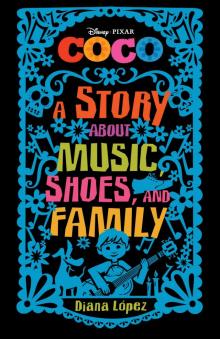 Coco Middle Grade Novel
Coco Middle Grade Novel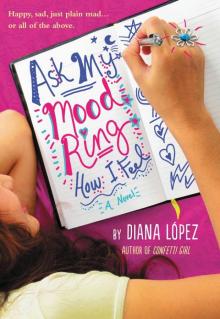 Ask My Mood Ring How I Feel
Ask My Mood Ring How I Feel Choke
Choke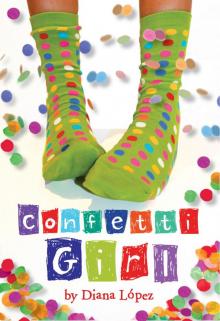 Confetti Girl
Confetti Girl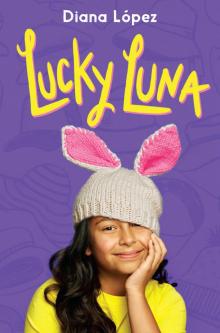 Lucky Luna
Lucky Luna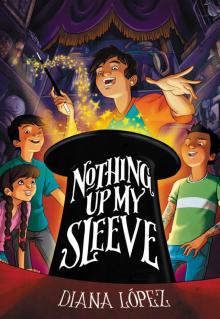 Nothing Up My Sleeve
Nothing Up My Sleeve